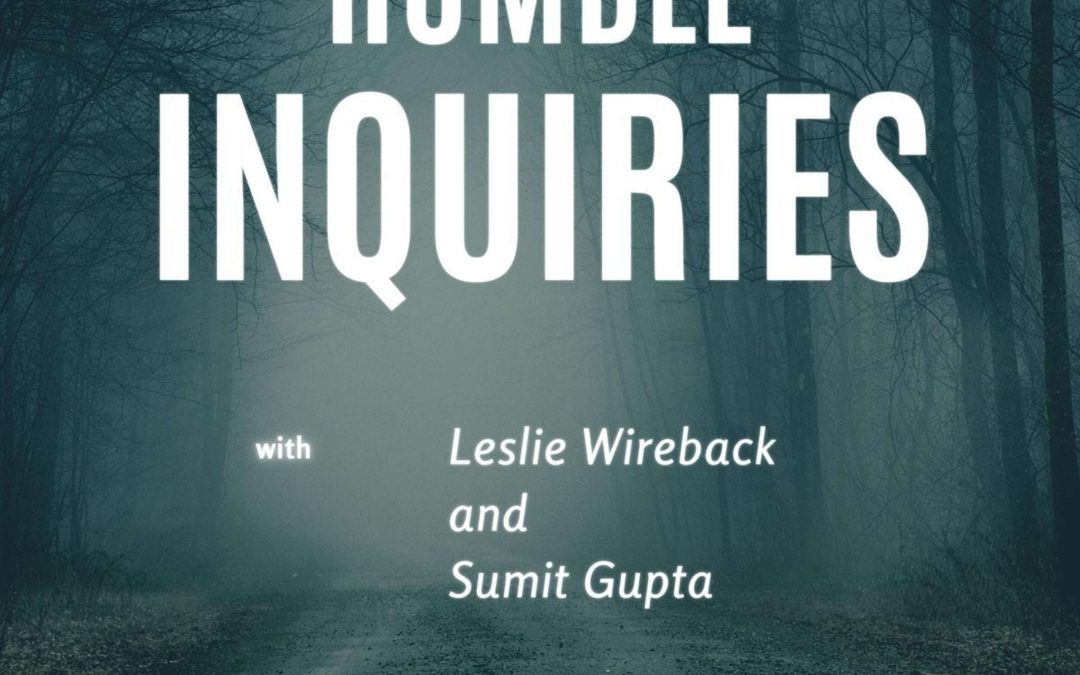This is the Humble Inquiries series. In this episode, Leslie joins me as my co-host to humbly inquire into Focus for leaders and teams. How to stay focused and get quality work done in the age of distraction? How to train your mind to get into a state of flow without getting interrupted every now and then?
In each episode of Humble Inquiries, we are deliberately going to put ourselves in the uncomfortable space of not knowing the answer and humbly inquiring about these challenges – with the aim to provoke new thoughts, actions, and practices – to help us better serve our coaching clients, and also to help the leader in you navigate the biggest challenges – at life and at work.
Show Notes
- Leslie – “coming back to the why and why am I doing this is really what has helped me generate more focus. “
- Sumit – “before we talk about focus, it’s very important to identify what to focus on and not just focus for the sake of focus, but focus always for the sake of producing a result.”
- Sumit – “we have to choose because if you try to focus on everything in a way you’re not focused on anything, “
- Sumit – “focus is also very closely tied to being committed, being responsible for what big responsibility that you have taken on.”
- Leslie – “not only does productivity go down because you’re flipping back and forth and then you’re slower. Your risk of errors is greater. “
- Sumit – “So if you’re driving, you can keep the whole route in your mind, but you have to focus on the road in front of you. So focusing on the present moment or the today is very important. “
- Leslie – “You think you need to do more, but that’s not necessarily how it pays off.”
- Sumit – “Does the phone owns you or do you own the phone? So again, as you said just because you have a phone doesn’t mean that you have to answer every call or you don’t mean that you have to keep it on at all times.”
- Sumit – “It’s just not healthy to hear a ping sound every five seconds or every five minutes, even, it’s just, or brains or bodies are not built for that. “
- Sumit – ” It’s not just about productivity. It’s also about health and wellbeing, which is so much more important. “
- Sumit – “You’re choosing at any moment. If you’re in a meeting and your phone rings, you’re choosing to answer that phone, right? If you’re in a meeting and your boss suddenly calls you, you’re choosing to answer your boss or choosing not to, but all of these are choices and we get away. We make it easier psychologically by using these like defence mechanisms or escapist language. Like I did not have a choice or I have been trying, but I have not been able to.”
- Leslie – “There are those moments of when and what suits, your kind of biological clock. So paying attention to it is really important. And, my way of doing that is noticing it and capturing it and journaling it and then adjusting my schedule so that I can take advantage of when suits me the best.”
- Sumit – “Multitasking is a myth. “
- Sumit – “the human brain is just not capable of doing two things at a time. You can do as many things as you want, but in any given moment, you can only focus on one thing.”
- Leslie – “you can quickly see how slow you are when you’re switching back and forth, as opposed to accomplishing one and then accomplishing the other task.”
- Sumit – “focus requires energy.”
- Leslie – “Just like your windows browsers, and you have too many tabs open, I have too many tabs open in my brain and I need to shut them down so that I can focus.”
- Sumit – ” we can hold only five to seven things in our short-term memory at a time.”
- Sumit – “If you take a bike and load it with so much stuff that it can’t move, that’s not the problem of the bike.”
- Leslie – ” I’ve now gone back to, headphones free and just enjoy the sight and sounds of nature.”
- Sumit – “there is also that notion associated that if I take time for myself then to feel guilty about that, that’s wrong or that’s selfish. But again, coming back to the metaphor of you always putting your own oxygen mask first, and in fact, that is necessary.”
As quoted by Edgar Schein in his book Humble Inquiry, an humble inquiry is recognizing that insights most often come from conversations and relationships in which we have learned to listen to each other and have learned to respond appropriately, to make joint sense out of our shared context, rather than arguing with each other into submission.

